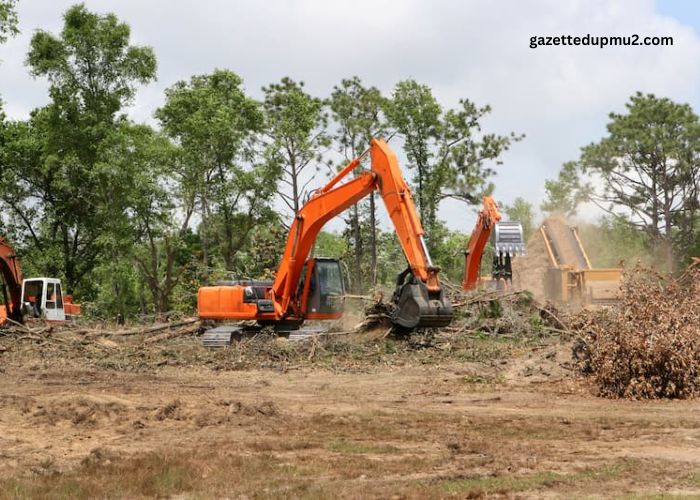Clearing land is an essential step in preparing your property for construction, landscaping, or simply improving its usability. Whether you’re looking to build a new home, expand your yard, or remove hazardous vegetation, understanding the process of land clearing in Massachusetts can help you make informed decisions. This guide will walk you through the different types of land clearing, necessary planning and permits, how to choose the right professionals, and the benefits of hiring experts for the job.
Types of Land Clearing
Before starting any land clearing project, it’s crucial to understand the different methods available. The right approach depends on your specific needs, property size, and future land use.
1. Selective Clearing
Selective clearing involves removing specific trees, shrubs, or undergrowth while preserving desirable vegetation. This method is ideal for homeowners who want to maintain the natural aesthetic of their property while improving accessibility and safety. Selective clearing is commonly used for:
- Creating walking trails
- Expanding yards while keeping mature trees
- Reducing fire hazards by clearing dense underbrush
2. Complete Clearing
Complete clearing removes all vegetation, including trees, stumps, brush, and roots. This approach is necessary for:
- Preparing land for new construction (homes, driveways, or commercial buildings)
- Large-scale agricultural or landscaping projects
- Preventing invasive species from spreading
3. Brush Removal
Brush removal is a lighter form of land clearing focused on eliminating overgrown vegetation, weeds, and small shrubs. This method is beneficial for:
- Enhancing property aesthetics
- Reducing the risk of pests and wildlife infestations
- Improving accessibility and visibility
Planning and Permits: What Homeowners Need to Know
In Massachusetts, land clearing isn’t as simple as cutting down trees and removing debris. There are environmental regulations and zoning laws in place to protect natural resources. Before starting your project, consider the following:
1. Check Local Regulations
Each town or city in Massachusetts has different rules regarding land clearing. Some areas may have strict environmental protections, especially if your property is near wetlands, conservation land, or within a designated historic district. Visit your local zoning office or town website to understand the specific requirements.
2. Obtain the Necessary Permits
Depending on the scope of your Land Clearing Massachusetts project, you may need one or more permits. These may include:
- Tree removal permits: Required if you plan to cut down protected or large trees.
- Wetlands permits: Necessary if your land is near protected water bodies or marshlands.
- Building permits: Needed if clearing is for construction purposes.
Failure to obtain the correct permits can result in fines, project delays, or mandatory restoration of cleared land. Always consult with local authorities before beginning any major clearing project.
3. Consider Environmental Impact
Massachusetts places a strong emphasis on environmental conservation. When planning your land clearing, consider erosion control measures, stormwater runoff management, and replanting efforts to maintain the ecological balance of your property.
Choosing a Reputable Land Clearing Company in Massachusetts
Hiring professionals ensures that your land is cleared safely, efficiently, and in compliance with state and local regulations. Here are some tips to help you choose the right company for your project:
1. Look for Experience and Licensing
A reputable company should have extensive experience with land clearing in Massachusetts and be fully licensed and insured. This guarantees that they adhere to industry standards and can handle unexpected challenges, such as tree removal near power lines or rocky terrain.
2. Check Reviews and References
Before hiring a land clearing service, read customer reviews and ask for references. Look for companies with positive testimonials, a history of timely project completion, and transparent pricing.
3. Request a Detailed Estimate
A trustworthy company will provide a written estimate that outlines the scope of work, costs, and project timeline. Be wary of businesses that offer vague pricing or demand full payment upfront.
4. Ask About Equipment and Techniques
Different projects require different equipment, such as mulchers, bulldozers, or specialized tree removal machinery. A good land clearing company should be able to explain their approach and use methods that minimize environmental impact.
Benefits of Professional Land Clearing
While some homeowners may consider DIY land clearing, hiring professionals offers numerous advantages:
1. Safety First
Clearing land involves heavy machinery, tree cutting, and debris removal, all of which pose safety risks. Professionals are trained to handle these tasks without causing damage to your property or putting lives at risk.
2. Efficiency and Speed
Professional land clearing teams have the tools and expertise to complete projects quickly and efficiently. What might take a homeowner weeks to clear manually can be completed in a fraction of the time by professionals.
3. Proper Waste Disposal
After land clearing, there will be significant debris, including tree stumps, branches, and brush. Professional services include debris hauling, recycling, or repurposing materials for mulch or firewood.
4. Compliance with Regulations
By hiring professionals familiar with local laws, you reduce the risk of legal complications and ensure your project meets all regulatory requirements.
5. Long-Term Property Enhancement
Proper land clearing improves soil health, prevents erosion, and lays the groundwork for future landscaping or construction projects. Professionals can also provide guidance on erosion control and sustainable landscaping options.
Final Thoughts
Massachusetts land clearing is a critical step in preparing your property for development, safety, and aesthetics. Whether you need selective clearing, complete clearing, or brush removal, understanding the process, securing permits, and hiring the right professionals are key to a successful project. By working with experienced land clearing specialists, you can ensure a smooth, compliant, and environmentally responsible transformation of your land.
If you’re considering land clearing in Massachusetts, take the time to research and plan properly. A well-executed land clearing project not only enhances your property’s value but also contributes to a safer and more visually appealing environment.
Need professional assistance? Start by consulting local experts who understand the unique requirements of Massachusetts land clearing and can guide you through the process with confidence.





